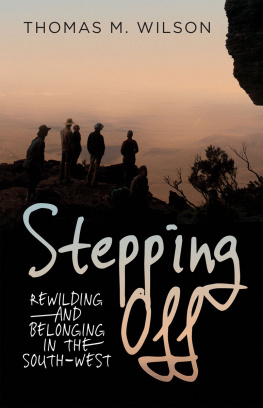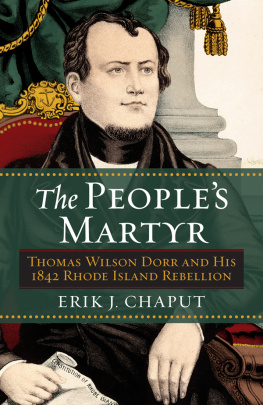The Ashley Cooper Plan
This book was published with the assistance of the Fred W. Morrison Fund of the University of North Carolina Press.
2016 The University of North Carolina Press
All rights reserved
Set in Miller by codeMantra
Manufactured in the United States of America
The paper in this book meets the guidelines for permanence and durability of the Committee on Production Guidelines for Book Longevity of the Council on Library Resources. The University of North Carolina Press has been a member of the Green Press Initiative since 2003.
Cover illustration: A New Description of Carolina by Order of the Lords Proprietors, 1672 map of the province from the early proprietary period. Courtesy of the North Carolina Collection, Wilson Library, the University of North Carolina at Chapel Hill.
Library of Congress Cataloging-in-Publication Data
Wilson, Thomas D., Jr., author.
The Ashley Cooper Plan : the founding of Carolina and the origins of Southern political culture / Thomas D. Wilson, Jr.
pages cm
Includes bibliographical references and index.
ISBN 978-1-4696-2628-4 (pbk : alk. paper)
ISBN 978-1-4696-2629-1 (ebook)
1. Political cultureSouthern StatesHistory. 2. City planningSouthern StatesHistory. 3. South CarolinaHistoryColonial period, ca. 16001775. 4. North CarolinaHistoryColonial period, ca. 16001775. 5. Southern StatesPolitics and governmentTo 1775. 6. Southern StatesSocial conditions. 7. Shaftesbury, Anthony Ashley Cooper, Earl of, 16211683. 8. Cities and townsSouthern States. I. Title.
F272.W76 2016
306.20975dc23
2015028006
Contents
Figures and Tables
FIGURES
1. Historic Plan of New Haven,
2. Idealized Depiction of Georgia,
3. A New Description of Carolina by Order of the Lords Proprietors,
4. Traditional English Manorial Plan,
5. Aristotles Class Pyramid,
6. The Great Chain of Being,
7. The New Society of the Enlightenment,
8. Newcourt Plan of London,
9. The Planned and Emergent Class Pyramids,
10. Crisp Map of Charles Town, 1704,
11. A View of Kamalia,
12. Map of West Africa, 1707,
13. Migration Patterns and Diffusion of Political Culture,
14. Generalized Map of American Political Cultures,
15. Working-Class and Oligarch Income Increase, 19202010,
16. Origin and Evolution of American Political Culture,
TABLES
1. Timeline of the Founding of Carolina in Historical Context,
2. Land Allocation and Agrarian Balance by County,
3. Composition of Parliament for Twelve Counties,
4. Timeline of the Founding of Carolina,
5. Grand Model Planning and Development Specifications,
6. Timeline of the Settlement of Carolina and Georgia,
7a. Principal Regional Political Cultures,
7b. Principal Metropolitan Political Orientations,
8. Elements of Ashley Cooper Republican Doctrine and Their Adoption in America,
9. Statehood and Antebellum Population in the South,
10. Timeline of Southern Settlement,
11. Population Profiles of the Thirteen States in 1790,
12. American Fraternalistic and Egalitarian Traditions,
Preface
Residents of South Carolina and visitors to the Lowcountry are familiar with the Ashley and Cooper rivers. The two rivers define the narrow peninsula occupied by the historic city of Charleston. They were named after a single person: Anthony Ashley Cooper, the 1st Earl of Shaftesbury, founder of the Province of Carolina.
Ashley Cooper and seven other noblemen established the Province of Carolina in 1670, chronologically midway between the foundings of Virginia and Georgia, the first and last of the original thirteen colonies. The province, which encompassed present-day North Carolina and South Carolina, created a social and economic framework in America that scholars in various disciplines have identified as a defining influence on national character.
Yet American history mostly neglects Ashley Cooper while celebrating other visionary founders such as Roger Williams, William Penn, and James Oglethorpe. The purpose of this book is to shine more light on the idealism underlying Ashley Coopers darling, as he called the colony, and then to follow the chain of events he set in motion to the present time. In doing so, it will be shown that he was influential in formatting one of Americas three principal political cultures. Further, it will be argued that the connection of contemporary political culture to the past is not a weak one, as Ashley Coopers perspectives and ideology remain with us today.
Ultimately, another purpose arises from the historical investigation, which is to offer inquisitive audiences practical new insight into the genesis of present-day political divides. In acquiring this new understanding, citizens and policy makers can become better advocates for progress in areas that currently seem to defy agreement. Readers who put this information to use may even be able to penetrate the veils of rhetoric separating them from their ideological critics, thereby attaining mutual understanding, if not agreement, in areas of critical concern.
The origins of todays political divisions is a vast subject area, but one that can be better understood in part by following a specific thread of history from Ashley Coopers plan for Carolina to the formation of a unique regional political culture that eventually grew beyond its borders to acquire national prominence and influence. As this is also a broad subject area, attention is placed on the interactions between political culture and urban policy, specifically as it influences city planning and similar rationalistic professions. This path through history leads directly to a finding that Americas urban-rural (or more precisely, urban-exurban) divide, enlarged by archaic political rhetoric, undermines critical thinking about serious contemporary problems.
Three European worldviews took root in colonial Americareligious communitarianism in New England, commercial pragmatism in the Mid-Atlantic region, and Gothic class-structured republicanism in the South. Each of these was challenged during the eighteenth century by the new ideals of the Enlightenment. The extent to which those new ideals were accepted or rejected in America modified the three early worldviews and gave birth to three distinct political culturesegalitarian, pragmatic, and fraternalisticwhich survived the colonial period and grew with the nation. Scholars have assigned various other names to these cultures, but there is basic agreement over their genesis and character. Although there have been many realignments in American politics, the three political culturesand the worldviews from which they are derivedare as strong in the twenty-first century as they were in the eighteenth century.
The three worldviews influence American character in ways that go beyond political culture. Religious denominations are often affiliated with a worldview and an associated political culture, as can be found with Southern Baptist Gothic republicanism and Unitarian humanism. Geographic patterns are also associated with the three traditions: Gothic republicanism is strongest in the South and in the nations exurbs, Enlightenment values are associated with the East Coast and the West Coast and urban areas, and wide swaths in between tend to be more pragmatic in beliefs. The geographic pattern of political cultures has produced an acute, unresolved, urban-rural animus, which is exploited by special interests to divide America. Professions, or occupations, are sometimes aligned with a tradition. An example taken up in Chapter 5 is that of the urban and environmental policy and planning professions, which are associated with the rationalism and humanism of the Enlightenment. Such professions have been described as the creative class by the urban theorist Richard Florida. They may be more specifically described as










